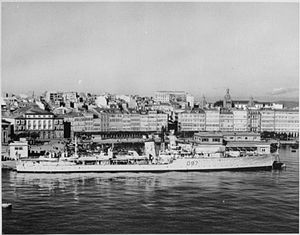HMS Corunna (D97)
 |
|
| History | |
|---|---|
|
|
|
| Name: | HMS Corunna |
| Ordered: | 1943 |
| Builder: | Swan Hunter, Tyne and Wear, United Kingdom |
| Laid down: | 12 April 1944 |
| Launched: | 29 May 1945 |
| Commissioned: | 6 June 1947 |
| Decommissioned: | 1967 |
| Fate: | Broken up 1975 |
| General characteristics | |
| Class and type: | Battle class destroyer |
| Displacement: | 2,480 tons standard |
| Length: | 379 ft (116 m) |
| Beam: | 40 ft 6 in (12.34 m) |
| Draught: |
|
| Propulsion: | Oil fired, two three-drum boilers, Parsons geared turbines, twin screws, 50,000 hp (37 MW) |
| Speed: | 35.75 knots (66.21 km/h) |
| Complement: | 268 |
| Armament: |
|
| Service record | |
| Part of: |
|
HMS Corunna (D97) was a later or 1943 Battle-class fleet destroyer of the Royal Navy. She was named in honour of the Battle of Corunna, which took place during the Peninsular War in 1809 between British and French forces. Corunna was built by Swan Hunter & Wigham Richardson Limited on the Tyne. She was launched on 29 May 1945 and commissioned on 6 June 1947.
In 1948, Corunna joined the 4th Destroyer Flotilla, part of the Home Fleet. In 1953 she took part in the Fleet Review to celebrate the Coronation of Queen Elizabeth II. In 1954, Corunna, with the rest of the Squadron, formerly Flotilla, deployed to the Mediterranean, remaining there until 1955. Corunna, with the rest of the Squadron, returned to the region in 1956. On 15 March 1959, Corunna accidentally collided with her sister-ship HMS Barrosa in the Bay Of Biscay. Later in 1956 she took part in the Suez Crisis.
Corunna subsequently began her conversion to a Radar Picket, of which three other ships were also converted. The conversion included new Anti-Aircraft weaponry, new radar, and the addition of the Sea Cat missile system. In 1962, Corunna joined the 7th Destroyer Squadron, based in the Mediterranean, and the following year joined the 21st Escort Squadron.
In 1964, Corunna deployed, along with the rest of the Squadron, to the Far East, where she would remain until 1965.
In 1967, Corunna was placed in reserve and was put on the disposal list in 1972. In 1975, Corunna arrived at Blyth in Northumberland where she was subsequently broken up.
...
Wikipedia
